
Learn to Read All Over Again With This Spectacular Speculative Story
io9 is proud to present fiction from LIGHTSPEED MAGAZINE. Once a month, we feature a story from LIGHTSPEED’s current issue. This month’s selection is “We Will Teach You How to Read | We Will Teach You How to Read” by Caroline M. Yoachim.
Note: The formatting of this story is essential to the reading of it—and some of the formatting was difficult to render in both web and ebook formats. To work around that, the story uses regular text whenever possible and has the text rendered as images when it is not.
If you prefer, you can also read this story on LIGHTSPEED’s website, where it may be easier to read. You’ll find it at lightspeedmagazine.com/HowToRead.
This is honestly one of the best stories I’ve ever read, and I wanted to make sure it was shared with as many people as possible. So I hope everyone who finds this doesn’t mind the extra bit of effort it might take.
—John Joseph Adams, Editor/Publisher of LIGHTSPEED.
ITERATION
This is our story, simplified: Life. Loss. Transformation. Love. Death. Iteration.




THIS IS OUR STORY, SIMPLIFIED
We read three times in the course of our lifespan: once with our parents to learn the story, once alone to add to the threads, and once with our children to teach them. History, science, philosophy, art. All we have ever known is here, in one thread or another, trapped in what—for you—would be a cacophony of overlapping words.
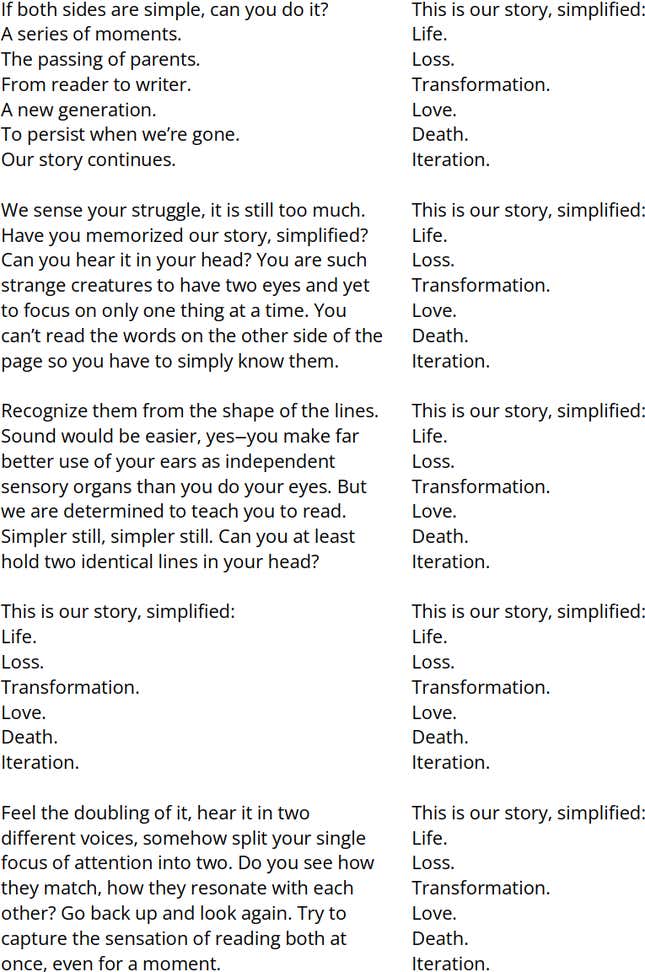
LIFE
You are ancient, and we are fleeting. Such a luxury, to have so much time that you need not rush though everything at once. And yet you are so horribly inefficient, to not make more of the time you have. Think what you could do in a single lifetime if you could read more than one thread at once, think more thoughts at once, hold more experience in every moment.
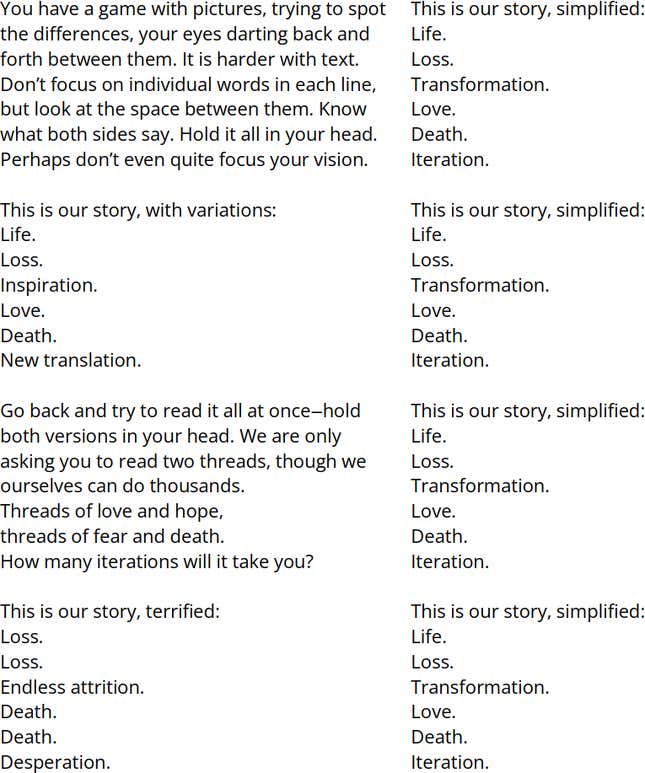
LOSS
Our generations are synced in a way that yours are not. Iterations of our story are not staggered, not muddled like those songs that you call rounds. An entire generation reads together in a single voice, three times: as children with their parents, as adults alone, and as parents with their children.
But with each generation, the number of those who read our story is diminished. Many children refuse to learn their parents’ words. There are too many threads, they say. There are so few of us remaining. Soon, our story will be lost forever. We must find another way.
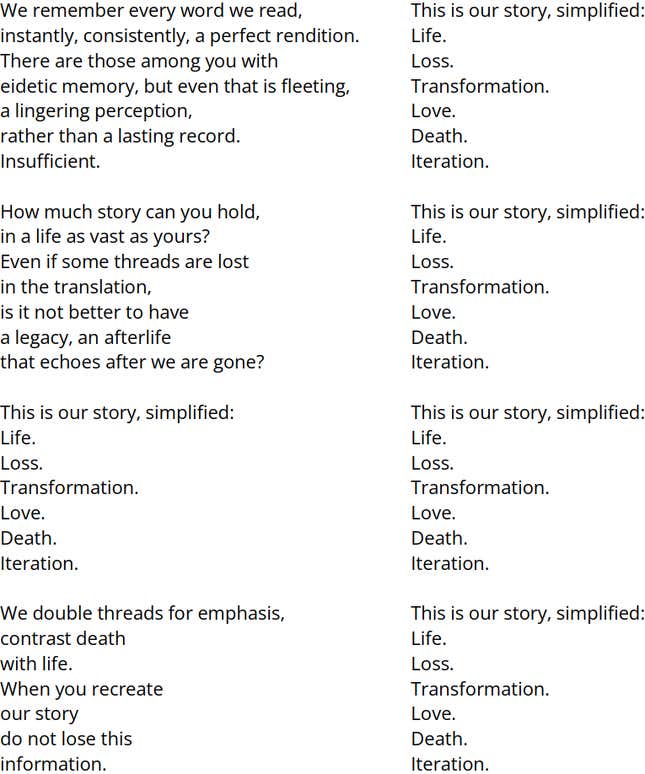
TRANSFORMATION
Can you make the shift, from reader to writer, when you can only barely read? We fear that you do not grasp the urgency—you know our lives are short compared to yours but fail to comprehend the magnitude of the difference. We read three times in the course of our lifespan: once with our parents to learn the story, once alone as we write new threads, and once with our children to teach them. There is nothing else but this, we live our entire lives while reading, and the time it takes you to read three times…
“This is our story, simplified:
Life.
Loss.
Transformation.
Love.
Death.
Iteration.”
…is for us a lifetime.
We have been trying to teach you to read for several generations. We are running out of time.
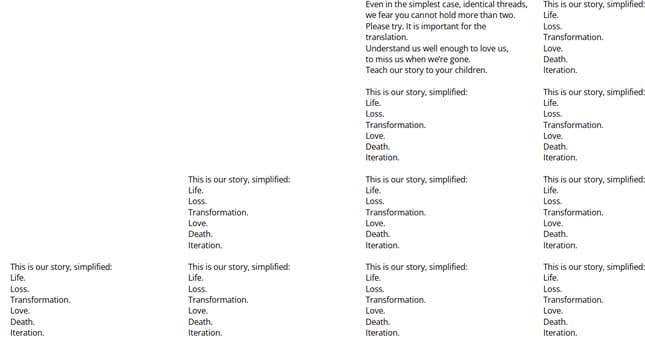
LOVE
The gift of words we give to our children is our greatest expression of love. We want to give this gift to you, even knowing how hard you must work to receive it.
Imagine our words, stretched into a thin vertical line…

…and set beside it all the variations, all our explanations, everything you usually read as a single stream of text chopped into smaller pieces and laid out side by side so we can fit it all within our lifespan, each generation adding a new column to the story, stretching it ever wider.
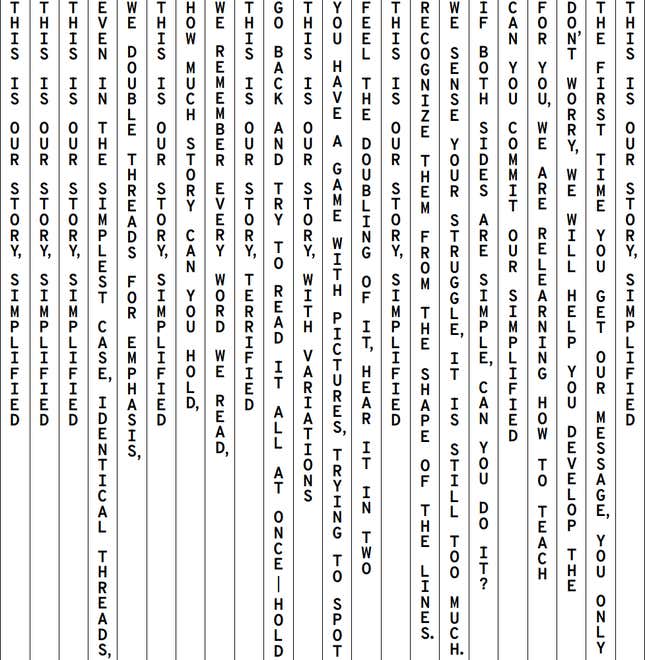
There’s a part of our story that describes finding you, our hopes and fears for you, and learning to communicate:

To even fit it on the page requires text a hairsbreadth wide, and it is still but a tiny fraction of our story.

DEATH
We are the last ones holding on to the old story. Our children are making something new. Please take these words we send you, read them, learn them, translate them into something your mind can understand. You might not add your threads and iterate as we do, but hopefully as you transform our words, you will keep some sense of the vastness of each moment, the illusion of holding more story in your mind than you are actually capable of holding.



COMMEMORATION | ITERATION
The entirety of their story has thousands upon thousands of threads. It is history told in moments that seem to happen all at once. It is science that progresses in increments almost infinitely small, and yet contains discoveries that even now we do not fully comprehend. It is their art, their language, their culture—everything they were determined to preserve. We have so much left to translate; this is only the beginning.
Give this story to your children, along with everything we have managed to translate, and perhaps one day the story will make its way back to the distant descendants of those who created it—ephemeral entities who, in the final generations of their decline, taught us a new way to read. When you teach this story to your children, do not start with all the threads at once. Instead, begin with a single line of text:
This is our story, simplified: Life. Loss. Transformation. Love. Death. Iteration.
About the Author
Caroline M. Yoachim is a three-time Hugo and six-time Nebula Award finalist. Her short stories have been translated into several languages and reprinted in multiple best-of anthologies, including four times in Best American Science Fiction and Fantasy. Yoachim’s short story collection Seven Wonders of a Once and Future World & Other Stories and the print chapbook of her novelette The Archronology of Love are available from Fairwood Press. For more, check out her website at carolineyoachim.com.

Please visit LIGHTSPEED MAGAZINE to read more great science fiction and fantasy. This story first appeared in the May 2024 issue, which also features work by Rory Harper, Ben Peek, Stephen Geigen-Miller, Marissa Lingen, Nisi Shawl, P H Lee, Ash Howell, and more. You can wait for this month’s contents to be serialized online, or you can buy the whole issue right now in convenient ebook format for just $3.99, or subscribe to the ebook edition here.
Want more io9 news? Check out when to expect the latest Marvel, Star Wars, and Star Trek releases, what’s next for the DC Universe on film and TV, and everything you need to know about the future of Doctor Who.
